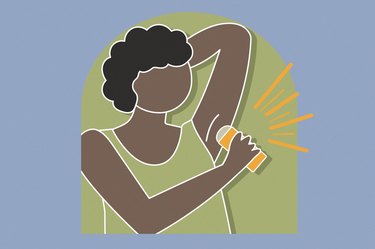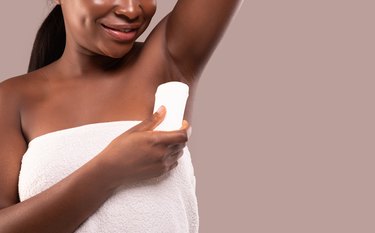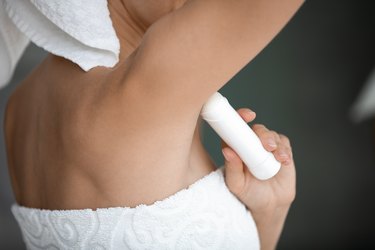
Your beauty and skin-care routine is made for little hacks. Like letting conditioner sit in your hair while you shower for enhanced silkiness and softness. Or slathering on body lotion right after the shower, when skin is still damp, to lock in hydration.
But there's one thing you might want to rethink in your post-shower routine: applying antiperspirant right after you towel off in the morning and head out to meet all the sweat-inducing stressors of the day.
Video of the Day
Video of the Day
It may come as a surprise, but there's actually a better time to apply antiperspirant. Here's what you need to know.
Exactly When to Apply Antiperspirant for the Best Effect
You might think swiping your underarms after your morning shower is the way to go, but you should actually apply antiperspirant at night, S. Tyler Hollmig, MD, director of dermatologic surgery and director of laser and cosmetic dermatology at The University of Texas at Austin, tells LIVESTRONG.com.
"Antiperspirants work best when applied to clean, dry skin," Dr. Hollmig says. Makes sense — but he adds: "Since we typically sweat less at night, applying antiperspirant in the evening often helps improve efficacy."
It's worth noting that the American Academy of Dermatology agrees with Dr. Hollmig on this one.
That's right: You may want to switch your shower-and-swipe routine to nighttime, before bed, in order to best fight odor and sweat.
Why Antiperspirants Work Best When Applied at Night
Dr. Hollmig explains that most antiperspirants are aluminum-based. "The aluminum blocks sweat ducts in order to reduce the amount of sweat reaching the skin's surface," he says.
When you swipe this onto clean, dry skin, the aluminum salts mingle with sweat to plug sweat glands. And it can take a few hours before this starts to work.
However, if you apply an antiperspirant right out of the shower — when you're still damp or a bit hot and sweaty from the water — the aluminum salts will mix with sweat before getting into the skin. That means the plug is created above the surface of the skin rather than getting into the sweat glands. And they'll just wash right off, Dr. Hollmig says.
"Antiperspirants are like a bathtub stopper. They work great when in position, but otherwise are worthless and just get sloshed around the tub," he says.
Tip
Barring physical activity and high indoor temperatures, we typically sweat the least before bedtime. By contrast, we automatically start sweating a little in the morning, even if it's not always noticeable.
What About Deodorant?
Isn't deodorant and antiperspirant the same thing? No, actually.
"Deodorants actually do not help reduce sweat. Instead, they mask odor by neutralizing bacteria or by emitting a scent that hides body odor," Dr. Hollmig says.
Because there are so many products out there — antiperspirants, deodorants, combination products, etc. — he recommends taking a moment to think about what you need (sweat-stopping, odor-fighting, or both?) before you buy. If you're not sure, you can always ask your dermatologist.
When Should I Apply Antiperspirant if I Shower in the Morning?
"This is one of those topics where each person has to choose their own adventure based on their propensity to sweat and goals for scent," Dr. Hollmig says.
If you shower in the morning, swipe on antiperspirant and then feel fresh as a daisy and sweat-free all day, then you're fine. No need to feel pressure to change a routine that's obviously working for you.
Same goes if you're someone who uses deodorant. No need to step up to an antiperspirant if your go-to odor-fighter is enough.
However, it may be worth switching up your product and/or routine if what you're doing now isn't cutting it. For instance, if you're using a deodorant right now but have breakthrough sweat that's pitting out your clothes, then consider moving to a stronger product like an antiperspirant.
Similarly, if you're a morning shower kind of person but notice that you have to constantly reapply antiperspirant throughout the day or it's not stopping sweat as well as it should, then try a shower at night, dry off thoroughly and completely and then apply antiperspirant before bed, giving it enough time to plug your sweat.
You can also try showering in the morning after you've applied antiperspirant the night before. This gives the aluminum salts in the antiperspirant time to block the sweat ducts rather than just sitting on the surface of the skin. Taking a shower in the morning shouldn't affect the antiperspirant's ability to do its job as you head into the day.
You could also try swiping on antiperspirant at night and again in the morning. There's not much research on the topic, but an older 2004 study in the Journal of the American Academy of Dermatology found this approach to be most effective for heavy sweaters.
If you don't want to use antiperspirant at night and really have to shower in the morning, try to wait 15 to 20 minutes after your shower and use a hair dryer on a cool setting to make sure your skin is truly dry before putting on the antiperspirant.
If no changes or special methods help, and sweating or odor is affecting your quality of life, it's a good idea to visit a dermatologist to discuss potential treatments.
You're feeling fresher already, aren't you?
Is this an emergency? If you are experiencing serious medical symptoms, please see the National Library of Medicine’s list of signs you need emergency medical attention or call 911.


